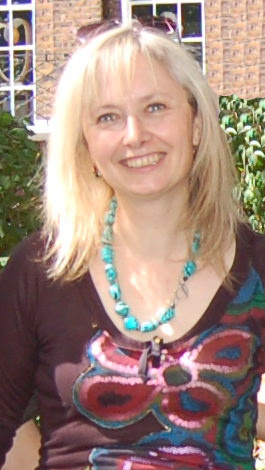Sojc, Natascha (Prof. dr.)
Natascha Sojc (Munich, Germany 1966) is Byvanck professor for Classical Archaeology at Leiden University. She studied Classical Archaeology, Ancient History and Archaeology of the Roman Provinces in Munich and Heidelberg. In her PhD she researched the iconography of grave reliefs from Ancient Greece focusing on the depictions of women and mourning (published in 2005 as Trauer auf attischen Grabreliefs). Sojc was appointed a professorship in Leiden in 2009, where she lectures on Greek and Roman archaeology, continuing her research on the Palatine in Rome.
Soressi, Marie (Prof. Dr.)
Marie Soressi is a Palaeolithic archaeologist working with paleogeneticists and geoarcheologists to better reconstruct the demise of Neandertals and their interactions with Homo sapiens. Since 2021, she has served as the head of the Human Origins Research Unit at the Faculty of Archaeology, Leiden University, a position previously held by its founder, Will Roebroeks.
Spadini, Elena (Dr.)
Elena Spadini is a researcher in digital humanities at at the Huygens Institute for the History of the Netherlands. She holds a Ph.D. in romance philology from Sapienza Università di Roma. Her research pursues digital scholarly editing, as regards the scientific and technical aspects, and includes medieval literature, the history of textual criticism and the history of digital humanities. She wrote on digital editing tools, automatic collation, the textual transmission of Arthurian old-French literature.
Spataro, Michela (Dr.)
Michela Spataro is a scientist in the department of Scientific Research at the British Museum (London, UK). Previously, as a Leverhulme Research Fellow at the Institute of Archaeology, she completed an archaeometric project on the earliest pottery from the central Balkans, the Starčevo culture. She has a degree in Literature and Philosophy and a PhD in archaeology from the Institute of Archaeology, University College London (UK).
Stancioff, Charlotte Eloise (Dr.)
Charlotte Eloise Stancioff is a Bulgarian-American GIS and Ecosystem services specialist. Born in Washington, DC but residing in the Netherlands, She holds a a BA in International Relations and Geography at the University of Chapel Hill in North Carolina and a MSc in Geoinformatics at the University of Toulouse-Jean Jaurès/ École Nationale Supérieure Agronomique in Toulouse, France.
Stapfer, Regine MA (MA)
Regine Stapfer is an archaeologist specializing in Neolithic wetland sites and works as a research and teaching assistant at the University of Bern (Switzerland), Institute of Archaeological Sciences (Prehistory). She is part of the research team of the project ‘Mobilities, Entanglements and Transformations in Neolithic Societies of the Swiss Plateau (3900–3500 BC)’ supported by the SNFS.
Staring, Nico (Dr.)
Nico Staring is a postdoctoral research fellow (Chargé de recherches) at the F.R.S.-FRNS / Université de Liège (2021-2024). He previously held a postdoctoral fellowship at Leiden University’s Walking Dead project and lectured at KU Leuven University. Staring received his doctorate from Macquarie University, Sydney, Australia.
Sojc, Natascha (Prof. dr.)
Natascha Sojc (Munich, Germany 1966) is Byvanck professor for Classical Archaeology at Leiden University. She studied Classical Archaeology, Ancient History and Archaeology of the Roman Provinces in Munich and Heidelberg. In her PhD she researched the iconography of grave reliefs from Ancient Greece focusing on the depictions of women and mourning (published in 2005 as Trauer auf attischen Grabreliefs). Sojc was appointed a professorship in Leiden in 2009, where she lectures on Greek and Roman archaeology, continuing her research on the Palatine in Rome.
Soressi, Marie (Prof. Dr.)
Marie Soressi is a Palaeolithic archaeologist working with paleogeneticists and geoarcheologists to better reconstruct the demise of Neandertals and their interactions with Homo sapiens. Since 2021, she has served as the head of the Human Origins Research Unit at the Faculty of Archaeology, Leiden University, a position previously held by its founder, Will Roebroeks.
Spadini, Elena (Dr.)
Elena Spadini is a researcher in digital humanities at at the Huygens Institute for the History of the Netherlands. She holds a Ph.D. in romance philology from Sapienza Università di Roma. Her research pursues digital scholarly editing, as regards the scientific and technical aspects, and includes medieval literature, the history of textual criticism and the history of digital humanities. She wrote on digital editing tools, automatic collation, the textual transmission of Arthurian old-French literature.
Spataro, Michela (Dr.)
Michela Spataro is a scientist in the department of Scientific Research at the British Museum (London, UK). Previously, as a Leverhulme Research Fellow at the Institute of Archaeology, she completed an archaeometric project on the earliest pottery from the central Balkans, the Starčevo culture. She has a degree in Literature and Philosophy and a PhD in archaeology from the Institute of Archaeology, University College London (UK).
Stancioff, Charlotte Eloise (Dr.)
Charlotte Eloise Stancioff is a Bulgarian-American GIS and Ecosystem services specialist. Born in Washington, DC but residing in the Netherlands, She holds a a BA in International Relations and Geography at the University of Chapel Hill in North Carolina and a MSc in Geoinformatics at the University of Toulouse-Jean Jaurès/ École Nationale Supérieure Agronomique in Toulouse, France.
Stapfer, Regine MA (MA)
Regine Stapfer is an archaeologist specializing in Neolithic wetland sites and works as a research and teaching assistant at the University of Bern (Switzerland), Institute of Archaeological Sciences (Prehistory). She is part of the research team of the project ‘Mobilities, Entanglements and Transformations in Neolithic Societies of the Swiss Plateau (3900–3500 BC)’ supported by the SNFS.
Staring, Nico (Dr.)
Nico Staring is a postdoctoral research fellow (Chargé de recherches) at the F.R.S.-FRNS / Université de Liège (2021-2024). He previously held a postdoctoral fellowship at Leiden University’s Walking Dead project and lectured at KU Leuven University. Staring received his doctorate from Macquarie University, Sydney, Australia.










